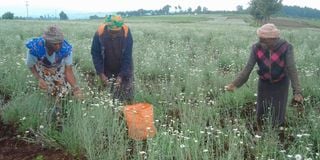Good pay lures pyrethrum farmers from state firm

Workers harvest pyrethrum at the Kenya Agricultural and Livestock Research Organization (Kalro) in Molo, Nakuru County on August 6, 2021.
The cash-strapped Pyrethrum Processing Company of Kenya (PPCK) is facing heightened competition from private processors in the South Rift region as farmers embrace the lucrative crop.
Farmers in the region are turning to private processors including Kentegra, Africhem Botanicals and HighChem to reap the maximum return from the crop, despite PPCK having one of the best factories.
According to Pyrethrum Growers Association official Joseph Towett, at its peak, PPCK used to crush at least 300 tonnes of dry flowers per month. But currently, the state corporation barely gets half of this annually.
“Most of the farmers who have embraced pyrethrum farming are contracted by private processors. PPCK is doing dismally. Farmers are delivering to the factory slightly below 150 tonnes of pyrethrum per year despite the heavy investment made by the national government,” said Mr Towett.
In Nakuru, Kentegra is mulling establishing a factory in the region.
“Plans are underway for Kentegra to set up a pyrethrum factory in Nakuru County by the end of the year. The revival of agriculture is a key pillar in my government. We are focused on restoring pyrethrum farming as a sustainable source of income for farmers,” said Governor Susan Kihika after a meeting with officials from the firm.
Kentegra is a United States-based company that contracts farmers and buys dried flowers from them.
Acreage in the county under pyrethrum continues to increase in Nakuru as the county works to revive production. The Nation has established the acreage has grown to at least 2,000, with about 5,000 farmers having embraced the crop.
Private processing companies in the South Rift Counties are paying farmers an average of Sh200 per kilo.
Ready market
A farmer, Mr Patrick Waweru from Molo, revealed that the private processors have provided farmers with ready markets for their crop, thus attracting more people to farm the crop.
“The main reason why farmers abandoned pyrethrum farming was because of delayed payments by PPCK, but the private processors have renewed our hope,” said Mr Waweru.
Kentegra has managed to contract over 2,050 farmers and achieved the highest coverage at more than 600 acres in Gilgil, Kuresoi South and Molo. Africhem, which has pitched tents in Gilgil, Naivasha and Molo has contracted 333 farmers with a total of 216 acres. HighChem has 62 farmers and 24.5 acres, while Africhem and Pypro have planted 10 acres each in Kuresoi North and Bahati sub-counties, respectively.
In Nyandarua, Agriculture, executive Francis Miring’u says reintroducing pyrethrum farming in the region will give farmers an alternative to potato and vegetable farming.
“The revival of the sector will go a long way towards improving food security apart from providing regular alternative income to farmers in the county who depend on potato, horticulture and vegetable for most of their income,” said the county official.
Kentegra Head of Operations Micah Thuo said that the firm has contracted about 1,852 farmers in Kenton, Mawingu, Turasha, Engineer, Kanjuiri and Tumaini, areas covering a total of 463 acres with a projection of 6,000 acres by the end of the year.
At the PPCK headquarters in Nakuru, an eerie silence welcomes a visitor.
An employee of the company, who spoke to the Nation on condition of anonymity revealed that the machines only switched on every three months after the company manages to accumulate enough dry pyrethrum stocks.
“PPC has to accumulate at least 100 tonnes to crush, a process that takes a minimum of three months due to low levels of supply by farmers,“ the worker said.






